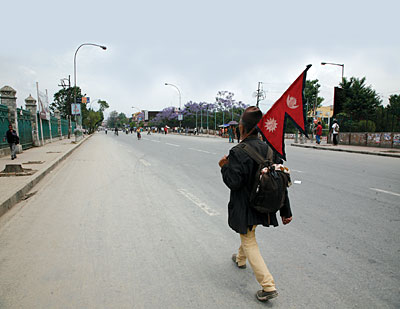 MIN RATNA BAJRACHARYA |
Chandra Acharya*, 35, is a single mother of two teenage girls, eking out a livelihood by working as a tailor in the day and cleaning houses in the evening. She became a Maoist three years ago because she believed that they would protect workers like her and create better job opportunities.
Last week, Chandra was asked to house Maoist supporters in the room she rents in Anamnagar. The room is tiny, badly lit, and can barely fit Chandra and her daughters. The only furniture they have is a narrow wooden bed shoved against a wall, two bamboo stools and a small book shelf that houses their meager utensils. A thin mattress is rolled up on the bed, and Chandra unrolls it every night to sleep on the floor so her two daughters can sleep on the bed.
"I have young daughters and am not willing to house strangers I know nothing about," she insisted, and bargained with the Maoist group she is affiliated with to let her simply participate in the protest marches instead of housing cadres. Now, she's marching with flags in the daytime and rushing to shop for food in the evening, before hurrying to clean houses. She leaves her daughters at home with instructions to finish homework and study for school.
"This is not the Nepal I want them to grow up in," says Chandra "This is not what I want for my children. I don't want them to see more riots than I have in my lifetime. I want them to go to school, be educated, and have good careers. I'm not sure what this banda thing is going to accomplish in the long run."
Last week, forty-three-year-old Norsang Tamang arrived in Kathmandu with a busload of people from villages in Rasuwa. Norsang is a farmer in Gatlang VDC with seven children, the youngest barely three years old. It's sowing season and he doesn't want to be in Kathmandu. His oldest son wasn't feeling too well when he left and his wife can't plough the fields alone. But the Maoists threatened to beat him and his son and wife up if he didn't pack immediately. So he did.
Norsang is not even a Maoist. He has no political leanings and no interest in who has power and who does not.
"I don't really care who the leader is.
I don't care what party is in power as long as they build good schools in the village so my children can learn and become better people, and let me farm in peace," he says.
He has had a stomachache since he arrived in Kathmandu, but has no money or any idea where to get medicine. "Where would I go? All the shops are closed," he says "I must return home at the earliest or we won't have enough for the winter. I've already lost so many days." He met a driver he knows from his village and arranged for a ride back home for whenever this is possible. Norsang pulls out a card that the Maoists gave him.
"They said I could ride for free if I show this card," he says, showing it to the person next to him.
"Dumb," the person reads aloud.
"Is that what it says," exclaims Norsang, and pulls it back. "I'm not dumb!" He puts it back in his backpack. It's still unpacked. "I don't take anything out in case I forget to put it back in when I leave. This city is godforsaken, there's no water even to drink. To think that there's a clear lake, Parbat Kunda, right by my house," he says.
He's ready to leave the first chance he gets. For the last week, he's woken up at dawn and instead of going out to the field to sow, he's followed the crowds through the streets of Kathmandu.
* names changed


